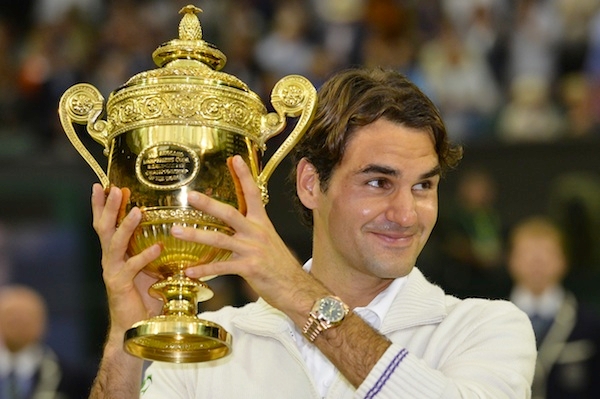This summer, like so many others in the past decade, belongs to Roger Federer. By reclaiming the men’s singles title at Wimbledon, after giving Andy Murray a set start, the peerless Swiss revealed what true greatness looks like in sporting togs. Seven times a Wimbledon champion, 17 times a winner of Grand Slam events: his record compels not so much admiration as awe, and it will surprise nobody if, next month, he retains the Olympic title he won four years ago.
He is, by general assent, the greatest of all tennis players, standing a cubit taller than Rod Laver, the Australian champion of the Sixties, who was at centre court to witness Federer’s latest achievement. He is certainly the most gracious man ever to swing a racket, which is why so many of us were rooting for him to beat Murray. If you believe that sport is a thing of beauty then you must love Federer, above all other tennis players; indeed, above all other sportsmen. He stands supreme in the way that Pelé once did in football, or Cassius Clay in boxing, or Garry Sobers in cricket. He is one of the blessed.
Yet he is not, as some have written, a genius, which may surprise some of those who flung that word around like confetti when the match had been won. No sooner had Federer collected his prize than Sue Barker, the simpering BBC presenter, who unforgivably calls Murray ‘Andy’, hailed Federer’s ‘genius tennis’. Simon Barnes, the chief sportswriter of the Times, whose superb essays from Wimbledon enhance this great annual tournament, amplified the word in his analysis of the final, and other scribes also made free with it when they were not peppering their copy with ‘sublime’, another word that is best avoided.
For too many sportswriters, who like to hear their words resound, ‘genius’ and ‘sublime’ are merely one level up from ‘jolly good’. At least, by using those words, they recognise that some sportsmen have qualities that cannot be acquired by practice alone. No amount of hitting a ball against a wall could have made Federer the player he is, even though those hours of practice helped to refine the talent with which he was born. But well-meaning as they are, they are mistaken, for genius lies beyond the grasp of the sportsman.
However it is defined, genius has something to do with the inexplicable, and sport is all too explicable. One may admire a sportsman’s skills — some of Federer’s strokes appear to challenge the laws of geometry — but each performance is chalked on the board in quantifiable terms. There are points won and lost, goals scored, wickets taken. There may be an element of mystery when the performers are on stage but the results are marked in black and white, and, as Murray found out when Federer reduced him to a blubbing mess, there is no right of reply.
Genius also has something to do with the unknowable. It is in the doing that great painters, for example, or great composers, or great poets, find themselves and declare their genius. Scientists, too, and philosophers, hence Kant’s belief in ‘the starry heavens above me and the immutable law within me’. Kant changed the way in which human beings look at the world. Federer has not, however glorious his groundstrokes.
Think of works of genius: the B-minor Mass, Uncle Vanya, Cézanne’s pears, Rodin’s bronzes, St Mark’s Cathedral. They enlarge our understanding, yet ultimately they are unknowable. You could listen to Beethoven’s late piano sonatas for the rest of your life and still not know them absolutely. Should that put you off? Of course not! It should set you on. As Artur Schnabel, one of the greatest interpreters of those sonatas, once said: ‘I play only that music which is greater than it can ever be performed.’
That is surely the finest tribute paid by greatness to genius. Nobody will ever say it of a sportsman, no matter how fast he runs, how high he jumps, or how beautifully he feathers the ball from the back of the court to confound the chap standing on the other side of the net. Sport, in its best moments, is a wonderful distraction but it is essentially trivial, and trivial things do not translate into genius. The great contests may illuminate our lives. The great players may live in our memories. They do not alter the way we see the world.
In his grace and beauty, Federer is without parallel in his sport. He deserves every prize that comes his way, and merits almost every superlative laid at his feet. He has given more pleasure to more people than almost any champion in any sport, and it is the dearest wish of his admirers that he plays on until his legs can carry him no more. But he is no genius.






Comments